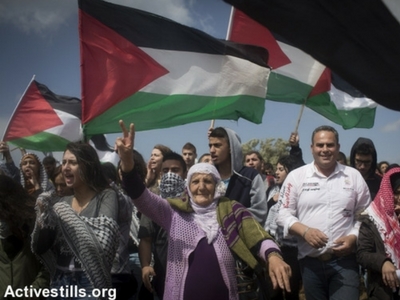www.aljazeerah.info
Opinion Editorials, August 2018
Archives
Mission & Name
Conflict Terminology
Editorials
Gaza Holocaust
Gulf War
Isdood
Islam
News
News Photos
Opinion Editorials
US Foreign Policy (Dr. El-Najjar's Articles)
www.aljazeerah.info
The Struggle for Palestinian Rights: Then and Now By James J Zogby Al-Jazeerah, CCUN, August 9, 2018 |
 |
 |
|
Forty years ago this month I left a tenured teaching position
and moved to Washington, DC to run the Palestine Human Rights Campaign
(PHRC). It wasn't easy doing Palestine work back then, and Washington
was an especially inhospitable city in which to pursue my new vocation.
Advocating for Palestinian rights can still be difficult, but so
much has changed in the past four decades that I thought it might be
useful to reflect on where we were in the 1970's and where we are
today.
Back then, major pro-Israel and establishment American
Jewish organizations threw their full weight behind the effort to
marginalize our work. They denounced and defamed us as supporters of
terrorism—a disgraceful effort to silence and isolate us because we
defended Palestinian rights—including the right to self-determination.
The language they used was so harsh and the charges they leveled against
us were so inflammatory that they took a toll. We received death
threats, hate mail, culminating in violent attacks and even murder.
Their campaign to make "Palestine" taboo also negatively impacted
our ability to build alliances. A few hardy Members of Congress
supported our defense of Palestinian victims—of torture, Administrative
Detention, collective punishment, or illegal expulsion from their
homeland. Most Members, however, even those with stellar human rights
records, begged off by citing their fear that if they were to defend
Palestinians it might damage their political careers.
At one
point, we even stopped testifying before Congressional committees since
they proved to be largely frustrating and unproductive affairs. Instead
of being allowed to make our case, our appearances only provided
pro-Israel Members of Congress with the opportunity to badger and insult
us with patently false scripted attacks ("Isn't it true that you are
supporting terrorists?" and other such nonsense).
Even
progressive foreign policy groups were intimidated. On two occasions we
were disinvited from membership in a major left-leaning foreign policy
coalition despite having won admission with an overwhelmingly favorable
vote. The reasons given for asking us to withdraw were that a few Jewish
groups threatened to leave the coalition if were to join, creating the
concern that the coalition might lose support from liberal Members of
Congress and financial assistance from liberal donors.
It wasn't
all gloom and doom. Despite struggling against great odds, we did win
some support for our work. A few principled Christian denominations
provided assistance, as did most of the civil rights leaders who had
been in Dr. Martin Luther King's circle. Major peace activists noted for
their leadership in the anti-Vietnam war movement also participated in
our campaigns and programs. Strengthened by this support, we weathered
storms and continued to grow.
Several developments occurring
between the late 1970's and the early 1990's contributed to improving
our ability to advocate on behalf of Palestinian rights. The first of
these were the public releases of two detailed indictments of Israeli
torture—the Washington Post's publication of the US Jerusalem Consulate
cables that documented Israel's systematic use of torture as a way of
forcing prisoners to confess to crimes they did not commit, and the
London Times' exhaustive study of Israeli torture of Palestinian
prisoners. In the wake of these shockingly disturbing reports, it became
difficult for some human rights leaders to remain silent.
In
1979, there was the "Andrew Young Affair" in which it was revealed that
Young, then the US Ambassador to the UN, had met with the PLO's UN
representative. In doing so he had broken the taboo that prohibited US
officials from having any contact with the PLO. Young lost his job, but
African Americans were outraged, leading many respected civil rights
leaders to trek to Beirut to meet directly with Yasir Arafat in a direct
challenge to the lunacy of the "no talk policy". On their return, these
same leaders joined our PHRC.
During the 1980's, many Americans
were horrified by Israel's especially brutal and senseless bombardment
of and occupation of Beirut, and the excessively cruel and violent
tactics Israel used to squash the first Intifada—in which stone-throwing
Palestinian youths confronted heavily armed Israeli occupation forces.
They were shocked by the scenes they saw and reports they read and
became more sympathetic to Palestinians and came to support our work.
Two other events, during this period also served to catapult the
Palestinian cause to a front and center position in American
consciousness and politics. The 1988 Jesse Jackson presidential campaign
mobilized Arab Americans, progressive Jews, African Americans, and peace
activists in support of Palestinian rights and "two-state solution" to
the Israeli-Palestinian conflict. Building on Jackson's leadership and
the growing awareness of the plight of the Palestinians, we were able to
pass pro-Palestinian planks in 10 state Democratic Party platforms and
have the first-ever floor demonstration and debate on Palestinian rights
at the Democratic National Convention.
The Oslo Accords of 1993
contributed to significantly altering the US landscape changing the
situation from Jews versus Arabs to those who supported a just peace
versus those who did not. Despite Oslo's weaknesses, it opened the door
to a discussion on Palestinian rights and gave legitimacy to
pro-Palestinian advocates who had been long been shunned for their
work.
It was these developments from this earlier period
that helped shape the political environment in which we are now
operating. But it didn't end there. Contributing to even greater change
are several new factors that must be considered. First and foremost is
the growing demographic and partisan divide over Israeli behavior toward
Palestinians. Millennials, African Americans and other "minority"
communities have been shocked by the crude and heavy-handed policies of
an increasingly hardline and overtly racist Israeli government. Further
exacerbating the divide is the way Israel and Trump (and his
conservative and right-wing Christian allies) appear to be locked in an
embrace. This right-wing pairing has been matched by the alliance that
has brought together the growing movement of young progressive Jews,
Arab Americans, and African Americans. This latter coalition found
expression first in the Bernie Sanders campaign and now in several other
political campaigns and pro-Palestinian initiatives on college campuses
and even a few notable efforts in Congress.
In several
significant ways the Palestinian reality, whether under occupation or in
exile has worsened in recent years, taking a horrific toll on both
Palestinian lives and aspirations. While US politicians may now feel
comfortable mouthing support for a "two-state solution", it is difficult
to imagine how such a solution can be implemented. It is even more
unlikely that some of the same elected officials who say they support
two states would consider taking the tough positions to force Israel to
end the occupation in order to allow a viable Palestinian state to come
into being. Their profession of support for two states, therefore,
appears to be hollow and designed more to side-step their responsibility
to address Israel's abuse of Palestinian human rights and justice.
Nevertheless, I remain more optimistic than I was forty years ago.
The developments that have occurred have had a profound impact. The
situation may be more difficult, but the movement for Palestinian rights
is stronger, larger, more diverse, and more deeply committed to justice.
There is new energy and new hope that we are turning a corner in our
ability to secure justice for Palestinians.
Disclaimer: The views and
opinions expressed in this article are those of the author and do not
necessarily reflect the position of the Arab American Institute. The
Arab American Institute is a non-profit, nonpartisan national leadership
organization that does not endorse candidates.
***
Share the link of this article with your facebook friends
|
|
|
|
||
|
||||||


